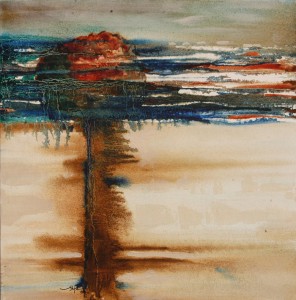
Artist Work 459 by Abid Hassan. Image Courtesy: ArtChowk Gallery.
By Zuha Siddiqui
“Out of this house,” said rider to reader,
“Yours never will,” said farer to fearer,
“They’re looking for you,” said hearer to horror,
As he left them there, as he left them there.
~ ‘O Where Are You Going?’, W. H. Auden
Sylhet
East Pakistan
September 1970
My mother doesn’t let me go to Auntie Pam’s house anymore. She stopped Munaf from letting me go last week – even though I had packed my satchel and sharpened my pencils and was really looking forward to playing tag with Rufus in the yard outside his house.
Bua’s favourite words are haye baba. Always exaggerated. A loud haye baba and a clap louder than the sound of Daddy’s rifle on hunting day means exuberance – elicited, for instance, when my mother gives her a fat packet every month or when Munaf cooks sarson ka saag. And a soft haye baba – chapped, betel-stained lips curved into an o, wispy brows furrowed – always implies fear. I heard it for the first time when my mother assembled Bua and Munaf and the gatekeeper and the cooks in the hall downstairs and told them to keep the gates locked because tigers were on the loose. We had been cornered by one on our way to the club.
That’s when we first played the game.
Mother calls it The Quiet Game. And then she says sshh. But Daddy just says shut-the-hell-up. I don’t always understand what Daddy says. I ask Mother what his words mean and she says that grown-ups sometimes say things they don’t mean and that little boys shouldn’t repeat their words – and then mother says sshh. There is only one rule: Make no noise. But chotu makes noise anyway – he’s a baby, mother says, and he can’t talk or understand what we say, so he cries – and so mother shoves a pacifier into his mouth.
We’ve been playing The Quiet Game a lot lately, especially after Daddy comes back home in the evening. I’m also not allowed to go outside and play because Uncle Kapil saw our house being marked. Mother says that it means that they know who we are and that we should move to Khala’s house soon. Khala lives in Karachi. It’s very far away, Daddy says, and he can’t leave the tea-gardens unattended. I don’t understand why, though. It’s not like he plants the tea himself.
I’ve also started playing The Quiet Game on my own a lot, especially at night. Mother puts me to bed at eight every day, even though I told her that I’m a big boy now – I’m seven and I know my times tables up till eight and I can add and subtract in my head and I will be going to boarding-school in Lahore with Bhai next year – and I can stay up with the grown-ups but Mother said no and Daddy said that Wee Willie Winkie will come and get me if I’m not in bed on time.
Bua puts me to sleep at night. Last night I saw her with Daddy’s old lighter. I know it was Daddy’s because it was silver and it had his initials, I and A. I think she was playing with it and I was supposed to tell Mother but I forgot. She has it again tonight. I know because she’s switching it on and off but it’s not working because it’s spoilt. That’s why Daddy threw it away. I tell her this but she tells me to keep quiet and sleep.
“Boka salaa.â€
I don’t know what it means. Bua and Munaf call me Chota Saab in front of Mother and Daddy and Bandhorr when Mother and Daddy are not there but never Boka salaa.
Bua wears rings on her fingers – on every single finger. One of her rings is bigger than my nose. The ring’s blue stones glitter in the darkness. I ask Bua why she’s playing with Daddy’s lighter when she isn’t supposed to and she twists my ear. Hard. Her ring digs into my skin and it stings and my eyes burn and a scream escapes from my throat. She clamps her hand down on my face.
“Nirbodha sisu. Keep quiet else I’ll push your screams down your throat.â€
I taste the grime stuck to her fingers. They smell like the trunk of Daddy’s car and the rotten fish that Munaf discards every Saturday. She presses harder and I wriggle and hit my feet against the bedposts. Mother always told me to never talk to strangers because strangers can do bad things but Bua wasn’t a stranger. Bua woke me up in the morning and gave me a bath and picked me up from school. I stop struggling and she lets go. I close my eyes.




